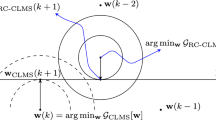Abstract
Least Mean Square (LMS) has been the most popular scheme in the realization of adaptive beamforming algorithms. In this paper a Robust Least Mean Square (R-LMS) algorithm is proposed which uses ratio parameters to control the contribution of product vectors in the weight upgrading process. The idea behind the proposed scheme is inclusion of previous information in place of relying solely on current sample. The performance enhancement by R-LMS algorithm is achieved with insignificant increase in computational complexity of LMS algorithm, so the crux of the conventional technique is not lost. Simulation results are also presented which illustrate that R-LMS provides relatively fast convergence, less Brownian motion and improved stability.
Similar content being viewed by others
References
Martin-Sacristan, D., Monserrat, J. F., Cabrejas-Penuelas, J., Calabuig, D., Garrigas, S., & Cardona, N. (2009). On the way towards fourth-generation mobile: 3GPP LTE-advanced. EURASIP Journal on Wireless Communications and Networking.
Stine J. A. (2006) Exploiting smart antennas in wireless mesh networks using contention access. IEEE Wireless Communications 13(2): 38–49
Nascimento, V. H. (2002). Improving the initial convergence of adaptive filters: variable-length LMS algorithms. 2002 14th International Conference on Digital Signal Processing. DSP 2002 (Vol. 2, pp. 667–670).
Kwong R. H., Johnston E. W. (1992) A variable step size LMS algorithm. IEEE Transactions on Signal Processing 40(7): 1633–1642
Shengkui, Z., Zhihong, M., & Suiyang, K. (2007). A fast variable step-size LMS algorithm with system identification. 2nd IEEE Conference on Industrial Electronics and Applications. ICIEA 2007 (pp. 2340–2345).
Ang W. -P., Farhang-Boroujeny B. (2001) A new class of gradient adaptive step-size LMS algorithms. IEEE Transactions on Signal Processing 49(4): 805–810
Aboulnasr T., Mayyas K. (1997) A robust variable step-size LMS-type algorithm: Analysis and simulations. IEEE Transactions on Signal Processing 45(3): 631–639
Ali, R. L., Ali, A., Anis-ur-Rehman, Khan, S. A., & Malik, S. A. (2011). Adaptive beamforming algorithms for anti-jamming. International Journal of Signal Processing, Image Processing and Pattern Recognition, 4(1).
Lobato E. M., Tobias O. J., Seara R. (2008) Stochastic modeling of the transform-domain algorithm. IEEE Transactions on Signal Processing 56(5): 1840–1852
Kun, Z., & Xiubing, Z. (2009). A new modified robust variable step size LMS algorithm. 4th IEEE Conference on Industrial Electronics and Applications. ICIEA 2009 (pp. 2699–2703).
Gorriz J. M., Ramirez J., Cruces-Alvarez S., Erdogmus D., Puntonet C. G., Lang E. W. (2008) Speech enhancement in discontinuous transmission systems using the constrained-stability least-mean-squares algorithm. The Journal of the Acoustical Society of America 124(6): 3669–3683
Long G., Ling F., Proakis J. G. (1992) Corrections to ‘the LMS algorithm with delayed coefficient adaptation’. IEEE Transactions on Signal Processing 40(1): 230–232
Ahn S. -S., Voltz P. J. (1996) Convergence of the delayed normalized LMS algorithm with decreasing step size. Signal Processing, IEEE Transactions on 44(12): 3008–3016
Tobias O. J., Seara R. (2004) Leaky delayed LMS algorithm: stochastic analysis for gaussian data and delay modeling error. Signal Processing, IEEE Transactions on 52(6): 1596–1606
Wang T., Wang C.-L. (1995) Delayed least-mean-square algorithm. Electronics Letters 31(7): 524–526
Douglas S. C., Meng T. H.-Y. (1994) Normalized data nonlinearities for LMS adaptation. IEEE Transactions on Signal Processing 42(6): 1352–1365
Erickson J., Har-Peled S., Mount D.M. (2006) On the least median square problem. Discrete and Computational Geometry 36(4): 593–607
Haykin S. (2002) Adaptive filter theory. Pearson Education, New Jersey
Kawitkar, R. S., & Wakde, D. G. (2005). Smart antenna array analysis using LMS algorithm. In IEEE International Symposium on Microwave, Antenna, Propagation and EMC Technologies for Wireless Communications. MAPE 2005 (Vol. 1, pp. 370–374).
Islam, M. T., Abdul Rashid, Z. A., & Ping, C. C. (2006). Comparison between non-blind and blind array algorithms for smart antenna system. CS-2006-1015 (pp. 1–8).
Chryssomallis M. (2000) Smart antennas. IEEE Antennas and Propagation Magazine 42(3): 129–136
Martinez, R., del Cacho, A., de Haro, L., & Calvo, M. (2002). Comparative study of LMS and RLS adaptive algorithms in the optimum combining of uplink w-cdma. In Proceedings on 2002 IEEE 56th Vehicular Technology Conference. VTC 2002-Fall. (Vol. 4, pp. 2258–2262).
Author information
Authors and Affiliations
Corresponding author
Rights and permissions
About this article
Cite this article
Ali, R.L., Khan, S.A., Ali, A. et al. A Robust Least Mean Square Algorithm for Adaptive Array Signal Processing. Wireless Pers Commun 68, 1449–1461 (2013). https://doi.org/10.1007/s11277-012-0533-6
Published:
Issue Date:
DOI: https://doi.org/10.1007/s11277-012-0533-6




